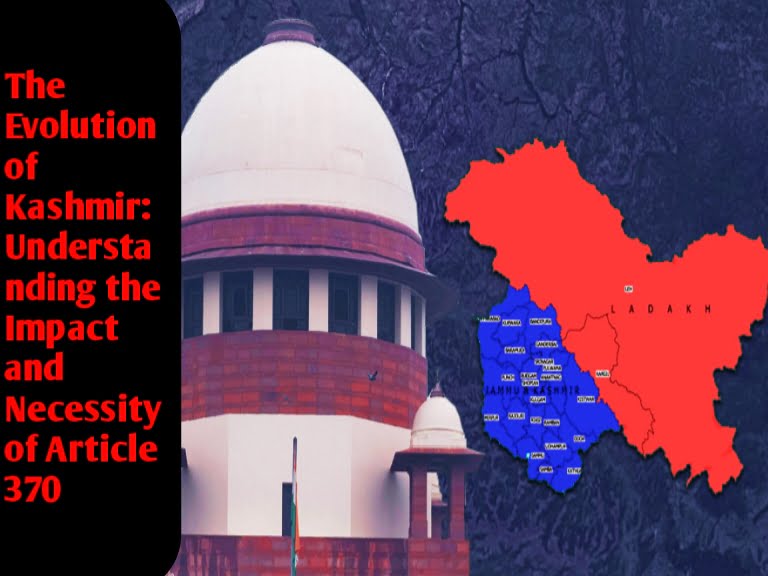The Evolution of Kashmir: Understanding the Impact and Necessity of Article 370
The Evolution of Kashmir
Kashmir, often referred to as “Paradise on Earth,” has a complex and tumultuous history. One of the most debated aspects of this history is Article 370 of the Indian Constitution, which granted special autonomy to the region. This article delves into the necessity of Article 370 and how the region has transformed over the years.
Historical Background:
- Accession to India:
- In 1947, after the partition of India and Pakistan, Maharaja Hari Singh, the ruler of Jammu and Kashmir, chose to accede to India under certain conditions, which included the introduction of Article 370. This article provided Jammu and Kashmir with significant autonomy, allowing it to have its own constitution, flag, and independence over all matters except foreign affairs, defense, finance, and communications.
The Necessity of Article 370:
- Political Autonomy:
- Article 370 was designed to respect the unique cultural and historical identity of Jammu and Kashmir. It allowed the region to govern itself with minimal interference from the central government, which was seen as crucial for maintaining peace and stability in a diverse and sensitive area.
- Economic Development:
- Proponents of Article 370 argued that special status was necessary for the economic development of the region. The autonomy allowed for tailored policies that addressed the specific needs and challenges of Kashmir.
- Cultural Preservation:
- The special status helped preserve the unique cultural and social fabric of Kashmir, which is distinct from other parts of India. This was seen as essential for maintaining the region’s identity and heritage.
Changes Over the Years:
Reading more… Olympics 2024: India’s Hopes for a Medal End Today
- Insurgency and Conflict:
- The late 1980s and early 1990s saw a rise in insurgency and violence in Kashmir, significantly altering the region’s dynamics. The demand for independence and greater autonomy fueled unrest and led to a protracted conflict involving militants, security forces, and civilians.
- Economic Struggles:
- Despite its natural beauty and resources, Kashmir’s economy struggled due to political instability, terrorism, and limited industrial development. Tourism, a major economic driver, suffered significantly during periods of heightened conflict.
- Demographic and Political Shifts:
- The demographic composition of Jammu and Kashmir has also changed over the years, with migrations and displacements caused by the conflict. Politically, there have been fluctuations in governance and control, with various political parties and coalitions attempting to navigate the complex landscape.
Revocation of Article 370:
- August 5, 2019:
- On this date, the Indian government abrogated Article 370, effectively revoking the special status of Jammu and Kashmir. The region was reorganized into two Union Territories: Jammu and Kashmir, and Ladakh. This move was justified by the government as necessary for integrating Kashmir fully into India and fostering economic development and stability.
- Reactions and Consequences:
- The revocation was met with mixed reactions. Supporters argued that it would lead to greater integration, investment, and development. Critics, however, saw it as an assault on the region’s autonomy and identity, leading to increased tension and unrest.
Current Scenario:
- Development Initiatives:
- The central government has launched several development initiatives aimed at improving infrastructure, education, healthcare, and economic opportunities in the region. Efforts are being made to attract investment and boost tourism.
- Security and Stability:
- Security remains a major concern, with ongoing efforts to combat militancy and ensure peace. The situation is closely monitored, and measures are continually adapted to address emerging challenges.
- Social and Cultural Impact:
- The social and cultural impacts of the revocation are still unfolding. There is a focus on preserving Kashmir’s heritage while promoting integration and unity within the broader Indian framework.
Conclusion: The necessity of Article 370 for Kashmir is a complex and multifaceted issue. While it provided political autonomy, economic opportunities, and cultural preservation, its revocation has brought new challenges and opportunities for the region.
Understanding the historical context and ongoing developments is crucial for appreciating the evolving dynamics of Kashmir. As the region navigates this new phase, the goal remains to achieve lasting peace, stability, and prosperity for its people.
How did you like the information given in our article today, please tell us in the comment section and for more such posts, follow our page The News House, thank you


